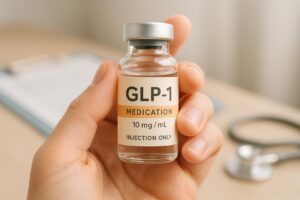Can You Take Probiotics with GLP-1?

Introduction
Did you know that the tiny microorganisms living in your gut can have a significant impact on your metabolic health? Recent research has increasingly highlighted the relationship between gut health and metabolic processes, particularly concerning hormones like glucagon-like peptide-1 (GLP-1). As the prevalence of obesity and type 2 diabetes rises globally, individuals are seeking effective strategies to manage their weight and improve their overall health. This has led many to wonder: can you take probiotics with GLP-1?
In this blog post, we will delve into the connection between probiotics and GLP-1, exploring how these beneficial bacteria might enhance the effects of GLP-1 medications. We will discuss the science behind GLP-1, the role of probiotics in metabolic health, and whether combining these two can provide added benefits for those on a weight loss journey.
By the end of this article, you will have a comprehensive understanding of how probiotics can influence GLP-1 levels, the various mechanisms at play, and practical advice for incorporating probiotics into your dietary regimen. Additionally, we’ll provide insights on how TrimRx’s personalized weight loss programs can help you achieve your health goals through a supportive, medically supervised approach.
Understanding GLP-1 and Its Role in Metabolism
What is GLP-1?
GLP-1, or glucagon-like peptide-1, is an incretin hormone produced in the intestines in response to nutrient intake. Its primary functions include stimulating insulin secretion, inhibiting glucagon release, delaying gastric emptying, and promoting satiety. These actions make GLP-1 a critical player in glucose metabolism and appetite regulation.
For individuals with type 2 diabetes or obesity, GLP-1 levels can be suboptimal, leading to challenges in managing blood sugar and weight. Medications like semaglutide (Ozempic® and Wegovy®) mimic the actions of GLP-1, helping to improve glycemic control and promote weight loss.
Why is GLP-1 Important for Weight Management?
The importance of GLP-1 in weight management cannot be overstated. By enhancing insulin sensitivity and reducing appetite, GLP-1 plays a vital role in controlling blood sugar levels and facilitating weight loss. Studies have shown that higher levels of GLP-1 can lead to reduced food intake and improved metabolic health, making it a target for therapeutic interventions in obesity and diabetes.
The Connection Between Probiotics and GLP-1
What Are Probiotics?
Probiotics are live microorganisms that confer health benefits when consumed in adequate amounts. They are often referred to as “good” bacteria and are commonly found in fermented foods, supplements, and yogurts. Probiotics help maintain a healthy balance of gut microbiota, which is essential for overall health and well-being.
How Do Probiotics Influence GLP-1 Levels?
Research has suggested that probiotics can positively affect GLP-1 levels through several mechanisms:
- Short-Chain Fatty Acid (SCFA) Production: Probiotics ferment dietary fibers in the gut, producing short-chain fatty acids like butyrate, acetate, and propionate. These SCFAs can stimulate GLP-1 secretion from intestinal L-cells, leading to increased levels of this beneficial hormone.
- Tryptophan Metabolism: Certain probiotic strains, particularly from the Bifidobacterium species, can metabolize dietary tryptophan into indole derivatives. These metabolites activate aryl hydrocarbon receptors on enteroendocrine cells, enhancing the expression of proglucagon, the precursor to GLP-1.
- Bile Acid Deconjugation: Probiotics can also modify bile acids in the gut, promoting the release of GLP-1 through signaling pathways involving the Takeda G protein-coupled receptor 5 (TGR5).
Evidence Supporting Probiotic Use for GLP-1 Enhancement
Several studies have explored the effects of specific probiotic strains on GLP-1 levels:
- Bifidobacterium and Lactobacillus Strains: Research has indicated that supplementation with Bifidobacterium and Lactobacillus strains can lead to increased GLP-1 secretion and improved metabolic markers. For example, a study demonstrated that participants consuming Lactobacillus reuteri had a 76% increase in GLP-1 levels compared to those on a placebo.
- Animal Studies: Animal models have shown that probiotics like VSL#3 can prevent obesity and diabetes by enhancing GLP-1 secretion through SCFA production. These findings suggest that probiotics not only support gut health but may also play a role in weight management and metabolic health.
Can You Take Probiotics with GLP-1 Medications?
Safety and Compatibility
For those considering the combination of probiotics and GLP-1 medications, the good news is that current evidence suggests a safe and potentially beneficial interaction. Probiotics can support metabolic health and enhance the effects of GLP-1 medications without adverse effects.
However, it is essential to approach this combination thoughtfully:
- Consult Your Healthcare Provider: Before starting any new supplement, including probiotics, it’s crucial to consult with your healthcare provider or a qualified professional. They can offer personalized advice based on your specific health needs and medications.
- Choose the Right Probiotics: Not all probiotics are created equal. It’s beneficial to choose strains that have been shown to support GLP-1 levels, such as Bifidobacterium and Lactobacillus species.
Tailoring Your Approach
At TrimRx, we understand that every individual’s weight loss journey is unique. Our personalized weight loss programs are designed to help you achieve your health goals while ensuring safety and effectiveness. We encourage clients to take our free assessment quiz to determine their eligibility for our prescription weight loss medications, which can complement any probiotic regimen.
Benefits of Combining Probiotics and GLP-1 Medications
Enhanced Appetite Regulation
One of the key benefits of combining probiotics with GLP-1 medications is improved appetite regulation. By increasing GLP-1 levels, probiotics may enhance feelings of fullness and help reduce overall caloric intake, making weight loss more attainable.
Improved Insulin Sensitivity
Research suggests that probiotics can improve insulin sensitivity, a critical factor for those managing diabetes or obesity. By supporting GLP-1 secretion, probiotics may contribute to better blood sugar control and metabolic health.
Gut Health Support
Incorporating probiotics into your regimen can also support overall gut health. A healthy gut microbiome is essential for nutrient absorption, immune function, and overall well-being. By enhancing gut health, probiotics can provide a solid foundation for effective weight management and metabolic health.
Practical Tips for Incorporating Probiotics into Your Routine
- Choose Quality Probiotic Supplements: Look for reputable brands that offer well-researched strains known for their benefits. Pay attention to the CFU (colony-forming units) count to ensure you’re getting an effective dose.
- Incorporate Fermented Foods: Include foods like yogurt, kefir, sauerkraut, and kimchi in your diet. These foods are natural sources of probiotics and can enhance your gut health.
- Monitor Your Body’s Response: As you incorporate probiotics, pay close attention to how your body responds. If you experience any discomfort, consult with a healthcare professional.
- Pair with a Balanced Diet: For optimal results, combine probiotics with a balanced diet rich in fiber, healthy fats, and lean proteins. This will provide the necessary nutrients to support both your gut health and weight loss goals.
Conclusion
In summary, probiotics can indeed be taken with GLP-1 medications and may offer enhanced benefits for those on a weight loss journey. By increasing GLP-1 levels through various mechanisms, probiotics can improve appetite regulation, insulin sensitivity, and overall gut health. As we strive to support our clients in achieving their health goals, we believe in the power of personalized, medically supervised care.
If you’re interested in exploring how TrimRx can assist you further, we invite you to take our free assessment quiz to determine your eligibility for our prescription weight loss medications. Together, we can work towards a healthier, more fulfilling life.
FAQ
Can probiotics replace GLP-1 medications?
No, probiotics should not be used as a replacement for prescribed GLP-1 medications. They can be taken in conjunction to support overall health and enhance the effects of the medication.
How long does it take for probiotics to work?
The time it takes for probiotics to show effects can vary depending on the strain and individual factors. Some individuals may notice changes within a few days, while for others, it might take weeks.
Are there any side effects of taking probiotics?
Generally, probiotics are safe for most individuals. However, some may experience mild digestive discomfort initially. If you have underlying health conditions, consult your healthcare provider before starting any new supplement.
How can I find the right probiotic for me?
Look for probiotics that specifically contain strains such as Bifidobacterium and Lactobacillus, which have been shown to support GLP-1 levels. Additionally, consider consulting with a healthcare professional for personalized recommendations.
With our commitment to safe, effective, and personalized weight loss solutions, we at TrimRx are here to support you on your health journey.

Transforming Lives, One Step at a Time
Keep reading
Tracking Progress With GLP-1: What To Measure
Learn which metrics to track on GLP‑1 therapy—weight, waist, blood sugar, lipids, side effects, and non‑scale wins—and how often to monitor them.
Fatigue Solutions for Ozempic and Wegovy Users
Hydration, protein-rich meals, light activity, and better sleep can reduce medication-related fatigue and help maintain energy during weight-loss treatment.
GLP-1 Medication Side Effect Checker
Worried about GLP-1 medication side effects? Use our free checker for Semaglutide, Liraglutide, and more to learn what to expect and stay informed!



